
 Time FM
Time FM

 Time FM
Time FM
7 April 2025, 8:44 pm
By Shadrach Bethel Afayo
In eastern Uganda, at the Mbale Regional Referral Hospital, a new chapter of hope has begun for the tiniest and most vulnerable members of the community – premature babies.
The launch of the “Hope and Vision” programme on March 25th, 2025, marks a significant victory in the ongoing effort to improve newborn health. This special initiative will focus on screening and treating Retinopathy of Prematurity (ROP), a serious eye condition that can lead to blindness in infants born too early. The programme promises a brighter future for countless families in the region.
The journey to this pivotal moment began on a day dedicated to these little fighters – World Prematurity Day, November 17th, 2024. Born on the Edge, an organisation deeply committed to improving the lives of premature babies, partnered with Colors and Brushes, a local painting event known for its community spirit.
Together, they organised a fundraising drive called ‘Paint for a preemie’ at the Elgon Museum in Mbale City. The goal was clear: to raise the necessary funds to establish a much-needed ROP screening programme at Mbale Regional Referral Hospital.
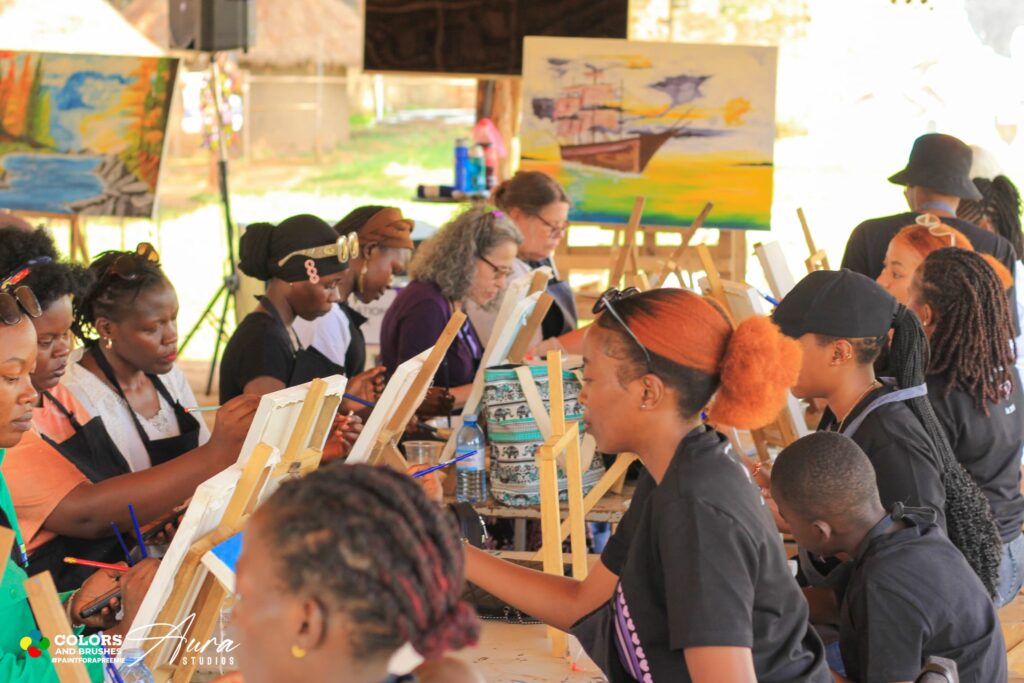
The response from the community was remarkable. People from all walks of life came together, demonstrating their support for this vital cause. Artists, community leaders, and everyday citizens contributed their time and resources. Key individuals like John Paul, the creative force behind Colors and Brushes, talented Mbale City photographer Meya Ukasha, and Dr. Martha Muduwa, a research medical officer at Mbale Regional Referral Hospital, played crucial roles in organising the event. Their collective efforts resulted in a large turnout and a significant achievement – over Shs 2 million was raised. This initial funding provided the essential foundation for the “Hope and Vision” programme.
The official opening of the programme on March 25th, 2025, was a day filled with optimism and gratitude. Mbale Regional Referral Hospital, in collaboration with Born on the Edge and EYESHA, an organisation specialising in child eye health, welcomed guests from the hospital administration, partner organisations, and the wider community. Retinopathy of Prematurity (ROP) was explained as a disease that affects the retina, the light-sensitive tissue at the back of the eye, in babies born before their due date. It is a major cause of childhood blindness, caused by the abnormal growth of blood vessels in the eye. The “Hope and Vision” programme now stands as a beacon of hope, offering the potential to prevent this devastating condition.
Dr. Kathy Burgoine, a dedicated Neonatologist and the driving force behind Born on the Edge, has been a constant presence at Mbale Regional Referral Hospital for the past decade. When she first arrived, the hospital did not have a specialised unit for newborns, yet the number of births was significant, with over 110 newborns in 2014 alone.
Dr. Burgoine and her team quickly identified critical areas that needed urgent attention to improve the care of these vulnerable infants. These included the basic but vital practice of handwashing to prevent infections, the urgent need for more nurses with specialised training in newborn care, the lack of a reliable water supply in the neonatal ward requiring a water tank, and the absence of clear national guidelines to guide the care of newborns.
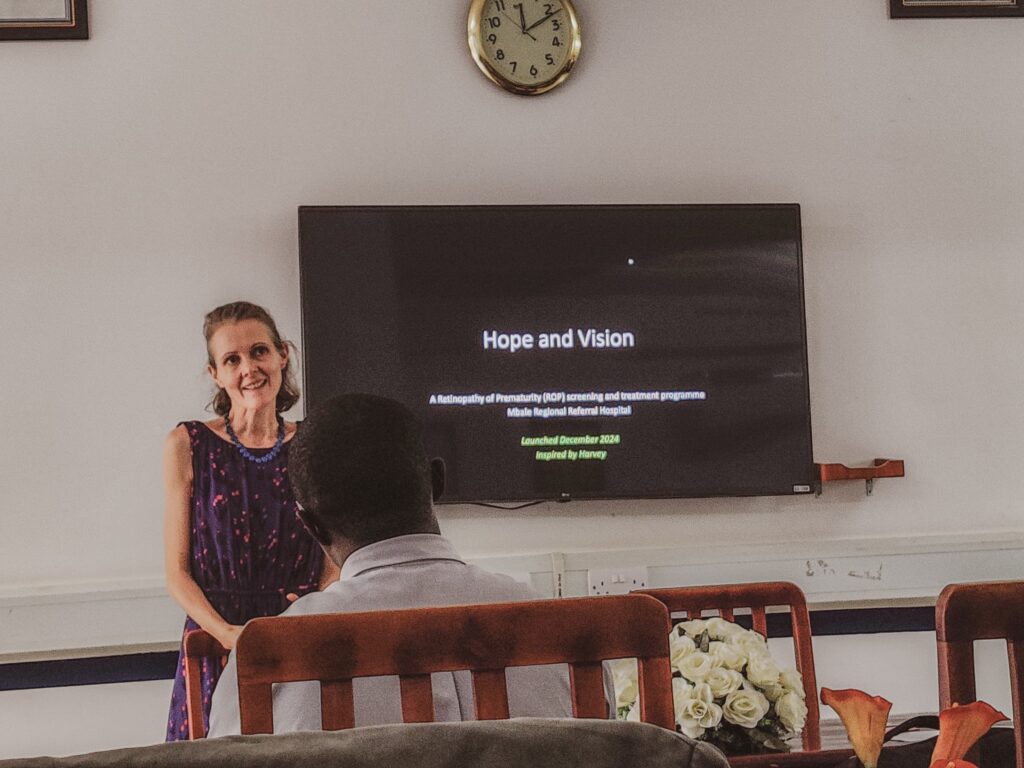
Over the years, Born on the Edge has worked tirelessly to address these challenges. Their focused efforts yielded significant results. In the first two years, the rate at which premature babies died at the hospital decreased from a high of 48% to 40%. This positive trend continued, and in the subsequent years, the mortality rate was further reduced to an impressive 20%.
Another remarkable achievement has been the increased survival of extremely premature babies. In 2014, not a single baby born weighing less than 1500 grams survived. However, with the introduction of better medical equipment and improved care practices, the mortality rate for all premature babies has now fallen from 48% in 2014 to just 12%.
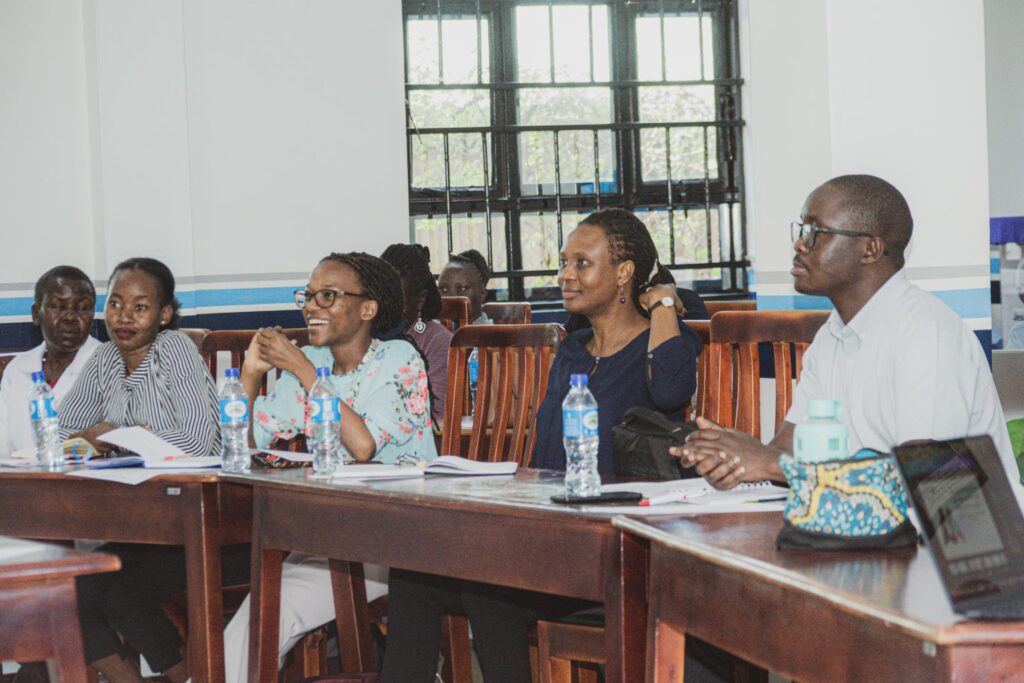
The hospital’s newborn admissions have also seen a dramatic increase over the past ten years, rising from over 100 babies per month to around 350 per month, demonstrating the hospital’s growing reach and impact beyond the immediate Mbale area.
Speaking at the official opening of the ROP treatment and screening programme, Dr. Burgoine emphasised the evolving understanding of newborn care. “Premature babies don’t just need to survive,” she stated, “Yes, we thought we were doing a great job by saving half of these babies, but it’s not just about surviving, it’s about thriving. The small babies as you save their lives and as they grow up, they need to be able to walk, to talk, to see and to hear.” She expressed her hope that the experience gained and the ROP programme established in Mbale would serve as a model, a foundation for expanding such vital services to more children across Uganda.
However, Dr. Burgoine also highlighted the ongoing challenges. The neonatal ward, designed for 20 beds, often accommodates 80-120 babies when at maximum capacity, a situation she described as a “Beautiful state of Chaos.” Furthermore, the lack of national guidelines for newborn care in Uganda presents a significant obstacle in addressing the various challenges faced in the neonatal health sector.
Dr. Proscovia Arach, an experienced Ophthalmologist at Mbale Regional Referral Hospital, echoed Dr. Burgoine’s sentiments, stressing the importance of addressing the long-term health of premature survivors. In her address, Dr. Arach pointed out that while the increased survival of premature babies is a positive development, many still face health issues that require attention.
She emphasised that timely screening is a crucial practice in the fight against ROP-related blindness. Dr. Arach explained that ROP is a condition affecting the blood vessels in the eye, with varying levels of severity. While some mild cases may resolve naturally, severe cases can lead to irreversible blindness, making early screening essential for prevention. “If we identify it early and manage it,” Dr. Arach affirmed, “we can be able to prevent it.”
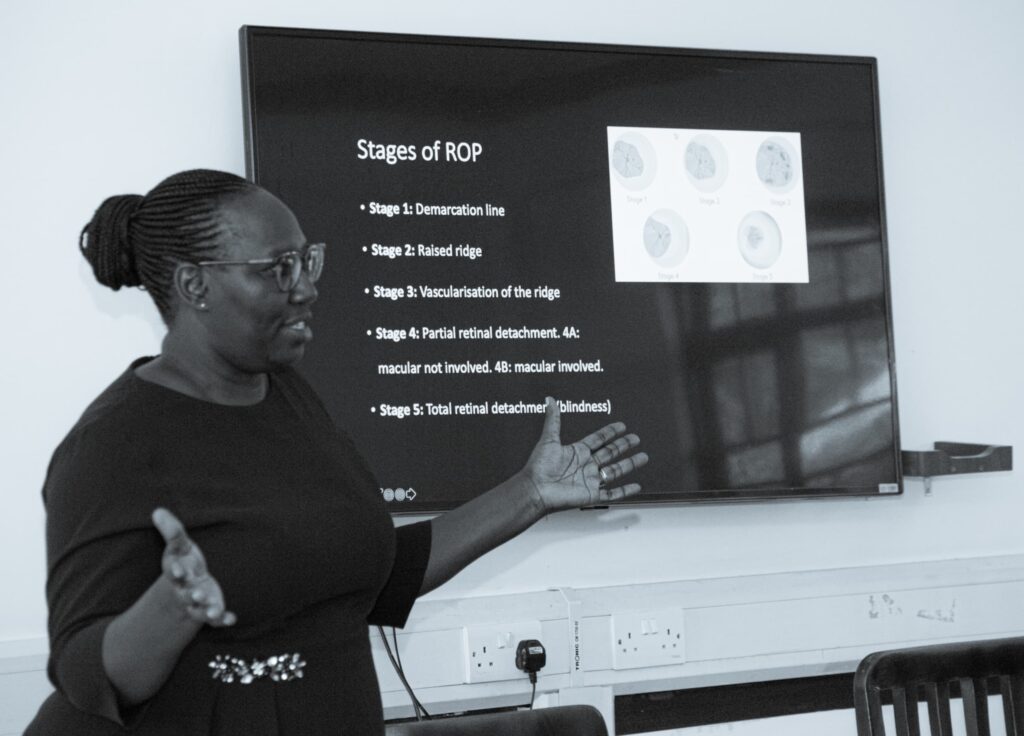
Dr. Iddi Ndyabawe, an Ophthalmologist associated with Born on the Edge and the lead for the ROP screening programme, has been instrumental in preparing the hospital staff for this specialised work. For the past five months, Dr. Ndyabawe has been training personnel at the hospital on how to effectively conduct the initial stages of ROP screening. He highlighted that the screening process requires the use of advanced medical equipment, much of which is not readily available in many healthcare facilities in Uganda. Dr. Ndyabawe also noted that Uganda currently lacks its own national guidelines for ROP screening and treatment, and they are relying on guidelines from the United States to inform their practices.
Despite these challenges, Dr. Ndyabawe expressed his hope that the progress achieved at Mbale Regional Referral Hospital in screening, treating, and caring for premature babies will serve as a valuable benchmark for other facilities throughout the country.
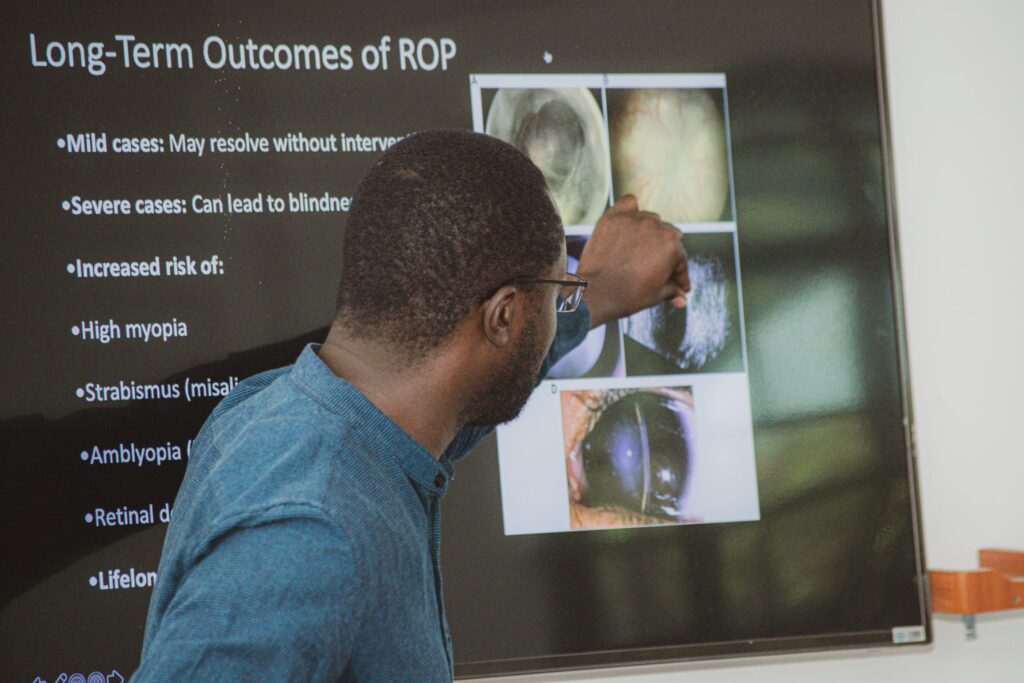
The ROP screening process, which began in December last year, has already demonstrated its vital role. In the short time since its launch, seven clinics have been conducted, providing eye screenings for 176 premature babies. During these clinics, 97 individual babies received care and attention. Tragically, within this initial period, over 24 cases of ROP were detected, highlighting the prevalence of the condition and the urgent need for the programme.
The establishment of this crucial programme was significantly motivated by the experience of a baby named Harvey. Born prematurely and having spent a month and two weeks in the neonatal unit, Harvey’s mother, Chemutai, noticed that her baby was having difficulty seeing after they returned home. Concerned, she contacted Dr. Burgoine, who quickly arranged a screening appointment for Harvey with Dr. Iddi Ndyabawe.
The examination revealed the heartbreaking reality: Harvey was suffering from severe ROP, which had progressed without early detection. At the official opening ceremony, a tearful Chemutai bravely shared her family’s ordeal, describing the immense hardship of watching her baby struggle with his vision. “It is hard being with Harvey at home because sometimes he doesn’t see, and that hurts me so much,” Chemutai said, her words underscoring the profound impact of ROP on families.
Nabwire Lydia, another mother who gave birth prematurely at 27 weeks to a baby weighing only 1 kilogram, spoke of her initial fears due to her baby’s small size. However, she found comfort and strength in the support of other mothers in the neonatal unit. She expressed her sincere gratitude to Dr. Burgoine and her team for the exceptional care they provided from her baby’s admission until their discharge.
Nabwire also shared her experience upon learning that her baby had ROP. “During our second week in the neonatal ward, Dr. Kathy told me that my baby’s eyes needed to be screened,” she recalled. “Dr. Iddi did the screening twice over two weeks and recommended treatment for ROP. We went into the theatre, and much as it was scary and painful, I am now happy that my baby can now see and follow gestures.” Nabwire’s experience offers a powerful message of hope, demonstrating the positive outcomes that early detection and timely treatment can achieve.
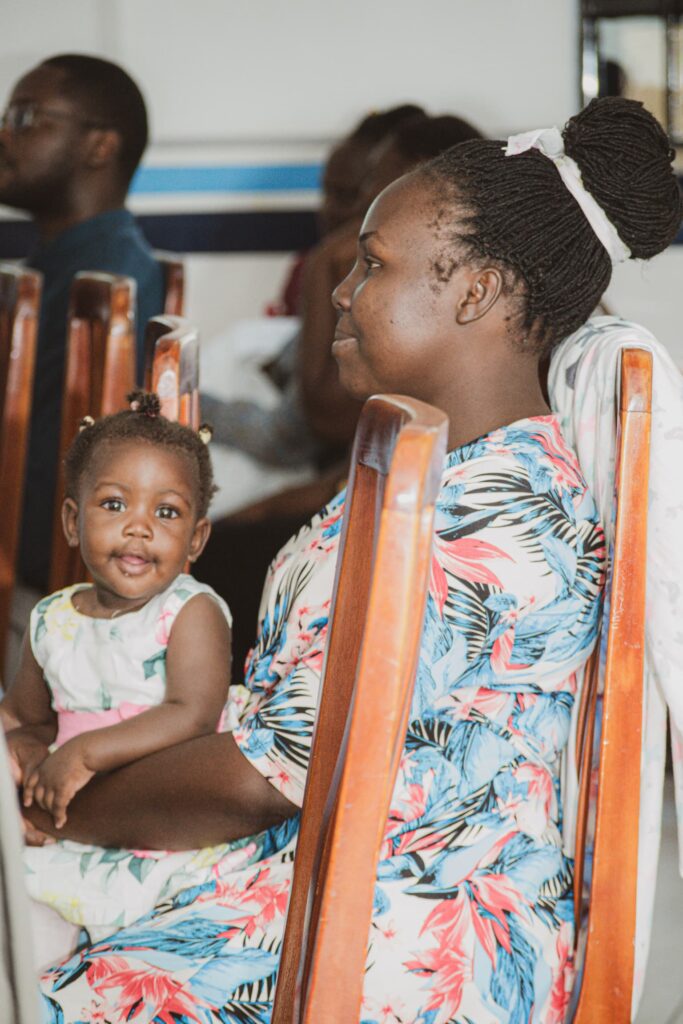
Dr. Shwetha, the research lead at EYESHA Foundation, a key partner in implementing child eye health and ROP programmes in low-income countries, outlined their long-term vision. She emphasised EYESHA’s commitment to working closely with the local community to ensure that these vital programmes can eventually operate independently.
Dr. Shwetha also acknowledged the crucial support of donors such as KIDROP and Have a Heart. “The goal is to expand the telescreening program so that more babies are reached, more are screened, and more are treated such that severe ROP ceases to exist,” Dr. Shwetha noted. “We also want to have at least 80% of the babies eligible to be screened actually receive the screening but to also get early treatment.”
Dr. Shwetha expressed her gratitude to the Ministry of Health for their support of this initiative. She explained that a primary reason for establishing the programme in Mbale and providing the advanced retinal camera is to create a sustainable system that can function effectively even without a constant on-site specialist, utilising remote specialist services when needed. Dr. Shwetha added that the programme also aims to ensure that the data collected will be used to develop and implement much-needed policies and guidelines for ROP screening and treatment in Uganda. She believes that the data gathered from this programme will be invaluable in creating national standards for newborn care.
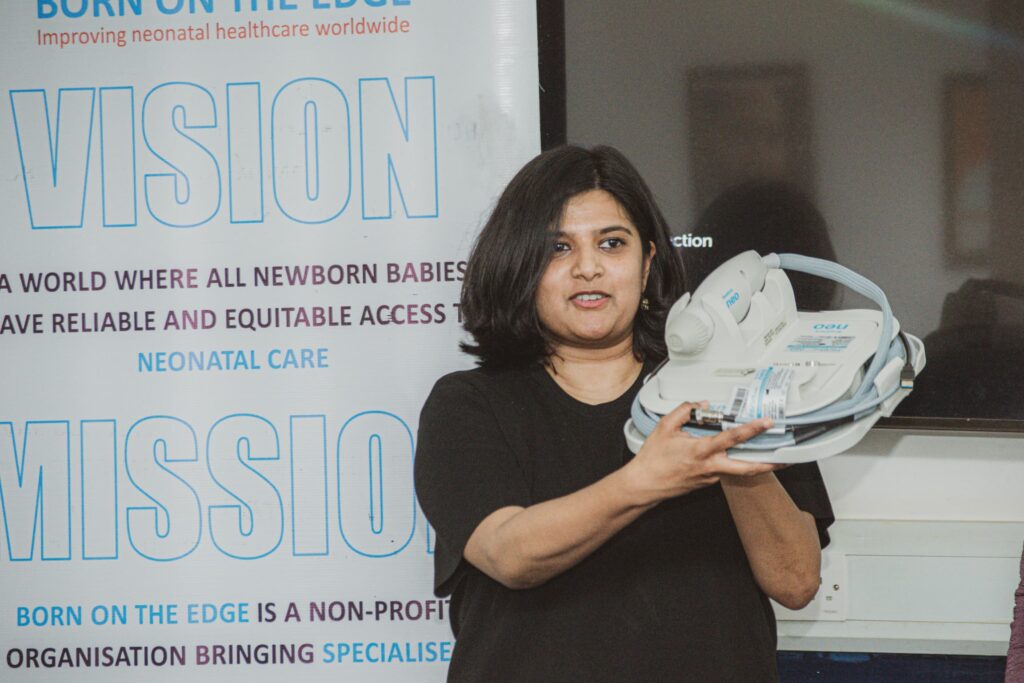
The official opening ceremony concluded with Dr. Julian Abeso, the head of the department of pediatrics at Mbale Regional Referral Hospital, expressing her sincere gratitude to EYESHA for their generous donation. She noted that this valuable contribution would serve not only the premature babies born at their facility but also the wider Elgon sub-region, significantly improving access to specialised care for vulnerable infants.